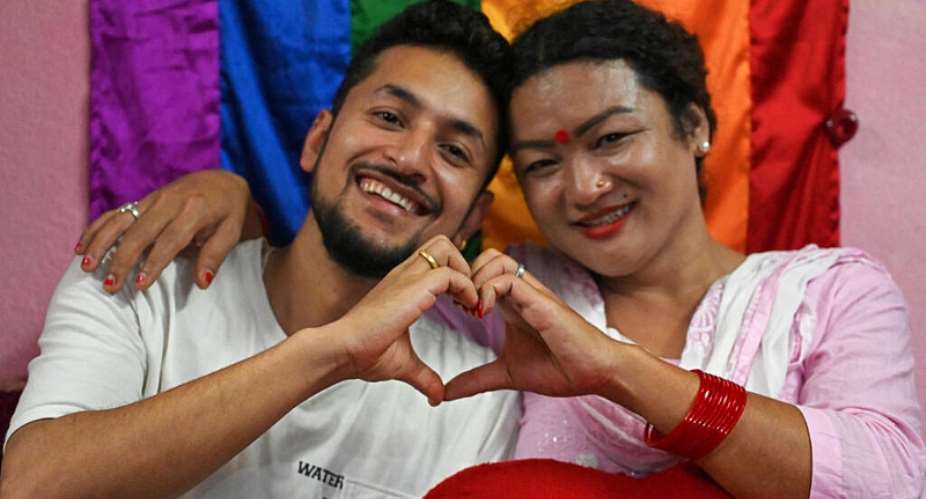Nepal has registered its first LGBTQ+ marriage in what is being hailed as a victory for transgender and same-sex couples in conservative South Asia.
Maya Gurung, a transgender woman, formally married her partner Surendra Pandey in Nepal's Lamjung district on Wednesday.
Gurung said the official registration of their union came five years after the couple said their vows in a Hindu temple, and nine years after they first met.
"We met in a restaurant and immediately liked each other. After a couple of weeks of courtship, we moved in together," she told the Kathmandu Post, a local English-language daily.
"But our family and society did not accept us. We then moved to Kathmandu. Although we got married in a temple five years ago, our marriage was not legally recognised."
Local official Yuvaraj Adhikari confirmed the marriage and said it was accepted in line with a ruling by the Supreme Court in June, which ordered Nepal's government to put in place a new legal framework to uphold same-sex and transgender marriages.
In the meantime, the court said, such marriages must be allowed to go ahead using a separate temporary register.
'Great achievement'
Gurung and Pandey's marriage makes Nepal the second country in Asia – and the first in South Asia – to allow LGBTQ+ marriage. Taiwan legalised such unions in 2019.
Pinky Gurung, a trans woman who heads Nepal's Blue Diamond Society for gay rights, said the news came as a "great pleasure".
"It is a great achievement for us, the third gender community of Nepal," she told reporters, welcoming the fact the "door has now opened for other people of the gay community to get their marriage legalised".
"There are many third-gender couples living without their identities and rights and this registration of same-sex marriage is going to help them a lot," she said.
Nepal has some of South Asia's most liberal laws on LGBTQ+ rights, having introduced reforms in 2007 that ban discrimination on the basis of sexual orientation or gender.
Citizens who identify neither as male or female are permitted to use a third gender on their passports and other official documents, in line with anti-discrimination guidelines spelled out in a new constitution approved in 2015.
Setbacks
But LGBTQ+ people report that discrimination and harassment, including violence, remains commonplace.
Even after the Supreme Court's ruling, Gurung and Pandey faced difficulties registering their marriage.
Kathmandu's district court rejected their marriage application in July, arguing it was not bound to follow the ruling of the top court since it was directed at the government. The couple's appeal was also rejected.
But on Wednesday, local officials confirmed they had issued the marriage certificate in line with the Supreme Court's decision and instructions from the national civil registration authority.
"Now their marriage has been temporarily registered and after the formulation of necessary laws, it will get permanent recognition automatically," activist Gurung said.
Others were not convinced the marriage would prove the watershed moment Nepal's LGBTQ+ community had been waiting for.
"It sounds simple, but the path to emancipation is likely to be hard because of deep-rooted religious views, superstitions and social stigma that still exists," commented another Nepali activist, Ram Prasad.





 Land disputes: We must strictly enforce land tenure, administrative laws—Securit...
Land disputes: We must strictly enforce land tenure, administrative laws—Securit...
 V/R: Keta NMTC appeals for support to fix damaged auditorium
V/R: Keta NMTC appeals for support to fix damaged auditorium
 Eugene Arhin is a blessing to us — Awutu Senya DCE
Eugene Arhin is a blessing to us — Awutu Senya DCE
 Confusion in NPP Walewale
Confusion in NPP Walewale
 Chieftaincy disputes becoming national security threats — Albert Kan-Dapaah
Chieftaincy disputes becoming national security threats — Albert Kan-Dapaah
 Exchange of old cylinders for new ones under CRM to begin soon — NPA
Exchange of old cylinders for new ones under CRM to begin soon — NPA
 Cocoa Farmers Association urges Akufo-Addo to disregard allegations against COCO...
Cocoa Farmers Association urges Akufo-Addo to disregard allegations against COCO...
 WN/R: Papaase residents kick against alleged plans to mine on River Kantango
WN/R: Papaase residents kick against alleged plans to mine on River Kantango
 CDD-Ghana criticises govt handling of Cecilia Dapaah’s money laundering case
CDD-Ghana criticises govt handling of Cecilia Dapaah’s money laundering case
 Ghana will not derail into political turmoil under my watch — Akufo-Addo
Ghana will not derail into political turmoil under my watch — Akufo-Addo
